The world we live in today is a troubled one. We are in the midst of a global pandemic that has resulted in tremendous loss: loss of jobs and income, education of children as we know it, social freedoms and gatherings, and life overall has come to practically a standstill. This has caused great anxiety to much of the population. But despite all that is going on in the world that we can’t control, it’s important to remember that God is in control and He is our hope. In this article, we are going to look at God: the Source of all Things.
The Issue
Today’s society has turned further and further from God and the focus has been taken off Him onto the natural and material things. But what must be realized is the natural things (Jobs, homes, cars, clothes, jewelry, etc) would not exist without God.
To put things in perspective, God is the source and the natural-material things are resources. Nothing exists without God. This is an unequivocal fact. John 1:2-3 reads, “The same was in the beginning with God. All things were made by him; and without him was not any thing made that was made.”
One of the greatest errors made in today’s society is the forgetting of God. But what has caused us to forget God?
Many people seldom think about God. Occasionally, the thought of God may cross their minds, but not often. God is not a major part of today’s thinking, neither of our lives. The world does not include God and our lives are not focused upon God. To most, God is way off and out of reach.
To some individuals, God may or may not (agnostics) exist. To others, God does not exist at all (atheists). Therefore, God is not a subject that dwells in their minds. As a result, God is simply rejected and denied; so, there is no need to give thought to God. God is forgotten.
The Warning
There is a clear and strong warning against this in the Scriptures. Let’s take a look in Deut 8:11-15:
11 Beware that thou forget not the Lord thy God, in not keeping his commandments, and his judgments, and his statutes, which I command thee this day:
12 Lest when thou hast eaten and art full, and hast built goodly houses, and dwelt therein;
13 And when thy herds and thy flocks multiply, and thy silver and thy gold is multiplied, and all that thou hast is multiplied;
14 Then thine heart be lifted up, and thou forget the Lord thy God, which brought thee forth out of the land of Egypt, from the house of bondage;
15 Who led thee through that great and terrible wilderness, wherein were fiery serpents, and scorpions, and drought, where there was no water; who brought thee forth water out of the rock of flint;
The setting of the passage is Moses preaching under the inspiration of God’s Holy Spirit. Notice what he proclaimed to the Israelites: Beware! Be careful! Be on Guard!
We must conscientiously guard against forgetting God. Three (3) conditions will cause us to forget God.

In verse 11, we see the encouragement to keep God’s commandments. Failing to obey God’s holy commandments will cause us to forget God. We must obey God’s commandments, by keeping our minds upon obeying them. If we neglect and ignore His commandments, we will grow cold and indifferent, soon forgetting about God. Our consciences and minds will become dull, insensitive, hard, callous, and dead to God (1 Tim. 4:1-2). The thoughts of God will before long pass from our minds. We will forget God.
On the other hand, if we obey God’s commandments, then He will be active in our hearts and lives. Our minds and thoughts will focus on God, and we will seek to fulfill His commandments. Step by step throughout the day, we will seek to please God by obeying Him. God will be alive in our hearts and thoughts. We will then not forget God.
In summary, keeping God’s holy commandments is the way to guard against forgetting God. On the other hand, failing to obey God’s holy commandments will cause a person to forget God.
In verses 12 and 13, we see what can happen with prosperity. Being prosperous, at ease, satisfied, and complacent can cause us to forget God.

This was of great concern to Moses for the Israelites. Once they had overpowered their enemies and settled down in the Promised Land, there was the danger that their subsequent prosperity would cause them to become satisfied and comfortable. They would become cozy in Zion. Notice how Moses warns the people against becoming complacent and satisfied with their prosperity:
- – They would have plenty of food, be full, and satisfied
- – They would have great and fine housing, settle down and be comfortable
- – Their wealth (gold, silver, herds, and flocks) would greatly multiply.
Our society, particularly in the US is duplicating Biblical Israel’s downfall. The relatively young United States has been blessed to become the most prosperous nation on earth—a superpower— and in the process has turned away and is continuing to turn away from God exponentially. Instead of focusing on the source (God), the focus is on the resources.
In verse 14 we see what can be the result of focusing solely on resources—pride.
Possessing pride and a sense of self-sufficiency can cause an individual and a nation to forget God. An individual or a nation can begin to feel that subsequent prosperity is due solely to knowledge, ability, and skill. We can  easily forget that our life, health, and strength—our very existence upon this earth—are due to God. It is God who willed us to be born and who had established the laws of reproduction through which we are born.
easily forget that our life, health, and strength—our very existence upon this earth—are due to God. It is God who willed us to be born and who had established the laws of reproduction through which we are born.
We Christian believers must guard our hearts against becoming proud and self-sufficient, from thinking that it is we alone that has produced the prosperity. We must not forget God: everything we have comes from God. God has willed for us to prosper; therefore, the Christian produces the products and possesses the things he owns. God is the primary, ultimate source of everything we are and have; our abilities, skills, health, and possessions. Man does not live upon this earth unless God wills him to live. Consequently, there is no place for pride or self-sufficiency within the heart of man. Humility and thanksgiving is to be entrenched in our hearts.
In summary, in the midst of all our prosperity, we the people of God must guard ourselves against becoming complacent, self-satisfied, at ease, comfortable. We must not become apathetic, lethargic, indifferent, sluggish, stagnant, cold-hearted, and unresponsive to God. We must not forget God.
We also see in verse 14 as well as verse 15 God’s protection. He delivered the Israelites from Egypt and saved them out of enslavement. This He did to give them the hope of the Promised Land. However, when they forgot God, they forgot their salvation. They forgot the very purpose for which God saved them, the very reason why they were living in the Promised Land.
If we forget God, we are forgetting the guidance and protection of God. We will forget that it was God who led us through our wilderness wanderings, through all the terrible trials and difficulties of our wilderness. We will  forget that He protected us from situations equal to our venomous snakes and scorpions.
forget that He protected us from situations equal to our venomous snakes and scorpions.
If we forget God, we will lose the guidance and protection of God. We will be left all alone upon this earth, leaving us only to what we can personally do for ourselves and what others are willing to do. In facing the trials and tribulations of life such as accident, diseases, financial difficulties, job or business problems, relationship difficulties, family and school problems—any problem or trial of life—the only help available will be the aid of flesh, only what we or some other person can do to help us. We will have lost the guidance and protection of God—if we forget Him.
If we forget God, we will forget His provision. It is God who provides the necessities of life: water to drink and food to eat. But, if we forget God, we lose God’s day-by-day provision, lose the assurance of having Him look after us. We will have no guarantee of the necessities of life. We must keep in mind that God had given the Israelites water gushing from a rock and manna to eat day-by-day out in the desert. They had no excuse for forgetting God.
Let’s look at verses 16-17:
16 Who fed thee in the wilderness with manna, which thy fathers knew not, that he might humble thee, and that he might prove thee, to do thee good at thy latter end;
17 And thou say in thine heart, My power and the might of mine hand hath gotten me this wealth.
In verse 16, we see one of the reasons God provides for us: to humble us. If we forget God, we will forget the humbling experiences. We forget that God tests us to make us stronger and to make things go smoother for us.
In verse 17 we see that if we forget God, we will forget humility and we develop a sense of self-sufficiency that leads us to believe that we did it all on our own.
The fact of the matter is, pride and a sense of self-sufficiency will lead an individual and a nation to forget God (Prov. 16:18); therefore, we must unquestionably guard against these two terrible sins, sins that cut the heart of God ever so deeply. Nothing can sink us faster spiritually than pride.
The Solution

But Moses not only shed light on the problem but he also passionately shared the solution in verse 18:
18 But thou shalt remember the Lord thy God: for it is he that giveth thee power to get wealth, that he may establish his covenant which he sware unto thy fathers, as it is this day.
This is the first of three (3) actions that will protect us from forgetting God.
Remember the source of all things: “the Lord thy God.” We must always remember that it is God who gives us the ability to work and produce. Our ability is due to God, not to us. But even more, there is another fact that we must grasp: God fulfills His covenant, the gift of the promised land. It is of essential importance to remember this.
Remember the past blessings. By focusing on past blessings, God is being recognized for what He has done in the past and keeps the focus on Him.
The Promised Land during the time of Moses was an earthy one (the land of Canaan). For us, it is a Spiritual one (eternal life in heaven), and no individual can enter or possess the Promised Land apart from God. The Promised Land is a precious gift of God and not the creation of man. Only God can yield the Promised Land to an individual. God and God alone is the source of all things. Focusing on this fact should keep an individual from forgetting God.
Verses 19 and 20 contain the second action that will protect us from forgetting God
19 And it shall be, if thou do at all forget the Lord thy God, and walk after other gods, and serve them, and worship them, I testify against you this day that ye shall surely perish.
20 As the nations which the Lord destroyeth before your face, so shall ye perish; because ye would not be obedient unto the voice of the Lord your God.
The second action is, consider the judgment of God. We must not forget God nor engage in false worship lest the judgment of God falls upon us. If we forget God, His judgment will fall upon us, destroying us just like it did the nations and peoples before us ( Sodom and Gomorrah, etc.).
The third action is recognize the sovereignty of God. No one recognized this better than David who wrote in Ps. 103:19, “The Lord hath prepared his throne in the heavens; and his kingdom ruleth over all.”
God is the ultimate ruler and is in control of all things at all times. We must recognize Him for who He is.
Conclusion
I am going to repeat something I wrote earlier: Our society, particularly in the US is duplicating Biblical Israel’s downfall. We are walking after other gods (vs. 19). We may not bow down and worship with statues as Israel did, but we do have our idols (jobs, careers, cars, houses, spouses, education/academic degrees, etc.). However, these are resources that we would not have without our source—God.
As the nation turns from God, it relies on the government. But the government doesn’t recognize God as it should and has become divided and dysfunctional; paralyzed to help the people as intended. This is apparent from the very top of the government to the lower echelons.
Another Scriptural warning is found in Rom 1:28-31
28 And even as they did not like to retain God in their knowledge, God gave them over to a reprobate mind, to do those things which are not convenient;
When God is removed from the mind and heart, He turns us over to our
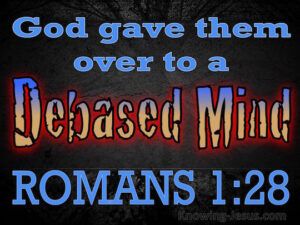
natural, depraved minds to do things that should not be done. The results are below.
29 Being filled with all unrighteousness, fornication, wickedness, covetousness, maliciousness; full of envy, murder, debate, deceit, malignity; whisperers,
30 Backbiters, haters of God, despiteful, proud, boasters, inventors of evil things, disobedient to parents,
31 Without understanding, covenantbreakers, without natural affection, implacable, unmerciful:
We are witnessing Scripture unfold before us!
Today the nation is highly divided and the atmosphere is toxic and saturated with uncertainty and mistrust. Rebellion and civil unrest headline the news. Unfortunately, there isn’t a clear end to the downward spiral. It is common knowledge that superpowers are not destroyed from without, but from within.
The United States has gone from the awe of the world as a superpower to a nation of immense vulnerability. The world is watching and is viewing the US with a mix of shock, vexation, and, most of all, bafflement. This is because she is duplicating Biblical Israel’s drastic downfall.
It is imperative for us, as Christians, to remember our source especially during these difficult times. Our resources may be threatened but our source is firmly in control and we are to focus on Him.
King Solomon was the wisest king that has ever lived. In his essay on life, he

concluded with the best advice ever. In Eccl 12:13 it reads:
13 Let us hear the conclusion of the whole matter: Fear God, and keep his commandments: for this is the whole duty of man.
Remember what Jesus said in Matt 6:33, “But seek ye first the kingdom of God, and his righteousness; and all these things shall be added unto you.”
First, seek God above all and “these things,” the resources, will be granted to us.
So be encouraged my brothers and sisters—TRUST GOD!
We walk by faith, not by sight (2 Cor. 5:7).
Amen!
Please feel free to leave any questions, comments, and concerns below.
Blessings!


 reap a harvest if we do not give up. NIV
reap a harvest if we do not give up. NIV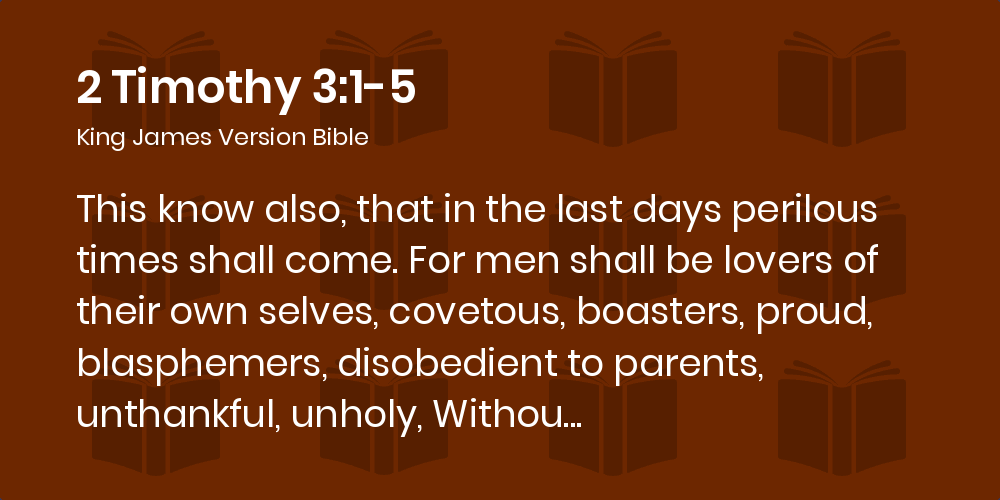 godless world. The world will be dangerous because it will be godless. As you read through, take note of how the terrible marks of the last days seem very much like a picture of today.
godless world. The world will be dangerous because it will be godless. As you read through, take note of how the terrible marks of the last days seem very much like a picture of today.
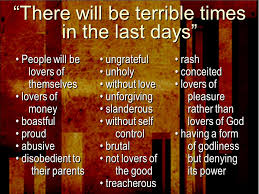 don’t have to think very hard!
don’t have to think very hard!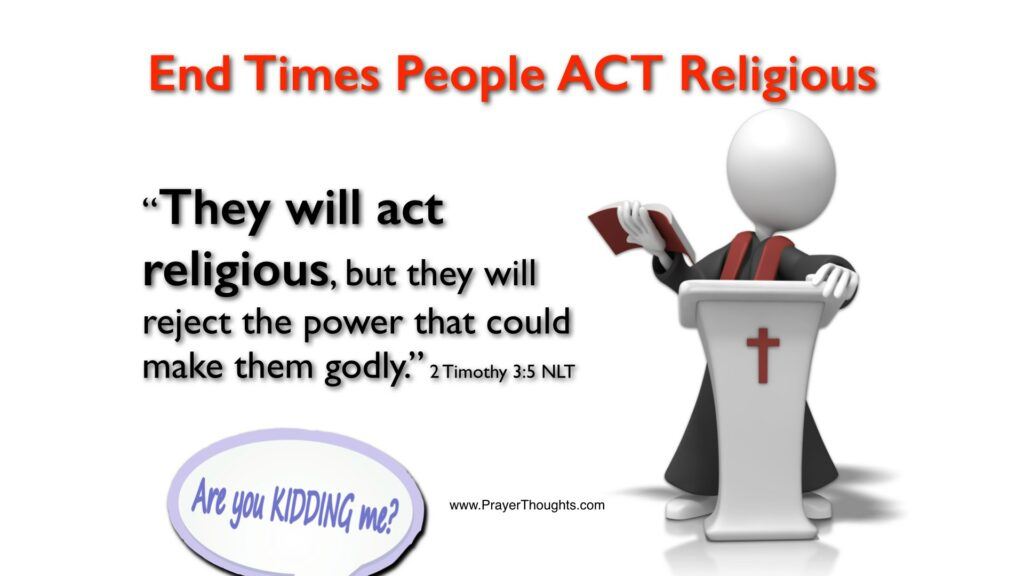

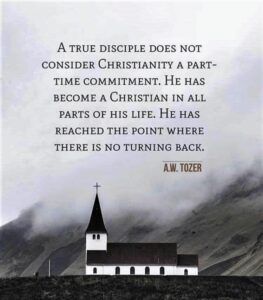

 have no pleasure in him.”
have no pleasure in him.”
 manifestations of the Gifts of the Spirit. [1 Cor. 12:1-11]
manifestations of the Gifts of the Spirit. [1 Cor. 12:1-11]
 after pledging — will be alienated from the Vine at the trunk and utterly discarded because they are worthless and frequently contaminate the rest of the vine. Therefore, fruitless followers are of no use to God’s kingdom and are good as dead.
after pledging — will be alienated from the Vine at the trunk and utterly discarded because they are worthless and frequently contaminate the rest of the vine. Therefore, fruitless followers are of no use to God’s kingdom and are good as dead. command. It additionally has a continuing emphasis; in that, the command to “abide” isn’t fulfilled in a one-time act. What abiding means for the disciples and all Christians presently is to make a perpetual, minute-by-minute determination to follow Christ. And we must not be passive. Instead, we Christians must be active because we have a lot to do.
command. It additionally has a continuing emphasis; in that, the command to “abide” isn’t fulfilled in a one-time act. What abiding means for the disciples and all Christians presently is to make a perpetual, minute-by-minute determination to follow Christ. And we must not be passive. Instead, we Christians must be active because we have a lot to do.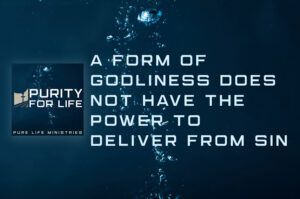 godliness as a cloak of respectability while denying God’s power over their lives by the way they live. This is simply hypocrisy.
godliness as a cloak of respectability while denying God’s power over their lives by the way they live. This is simply hypocrisy.


 attending of church services. He is trying to get our attention. For more on this, please read the article,
attending of church services. He is trying to get our attention. For more on this, please read the article, 




 reveal the mind of God, how He thinks, and even some of His plans.
reveal the mind of God, how He thinks, and even some of His plans.
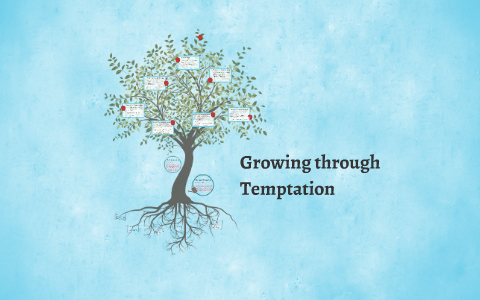 one? Probably a bad thing right? But that may not always be the case, as we will see in this article as we look at growing through temptation.
one? Probably a bad thing right? But that may not always be the case, as we will see in this article as we look at growing through temptation.
 because we are faced with temptation doesn’t mean we have to give into it. We always have a choice to give in to it or reject it. Just know that every time we overcome temptation, we become more like Jesus.
because we are faced with temptation doesn’t mean we have to give into it. We always have a choice to give in to it or reject it. Just know that every time we overcome temptation, we become more like Jesus. an enemy to his camp. So, they are coming and will continue to come. Scripture reads, “…But when you are tempted…” [1 Cor. 10:13 NIV] not if.
an enemy to his camp. So, they are coming and will continue to come. Scripture reads, “…But when you are tempted…” [1 Cor. 10:13 NIV] not if. The Scripture reads in James 4:7-8, “Submit yourselves therefore to God. Resist the devil, and he will flee from you. Draw nigh to God, and he will draw nigh to you…”
The Scripture reads in James 4:7-8, “Submit yourselves therefore to God. Resist the devil, and he will flee from you. Draw nigh to God, and he will draw nigh to you…”

 after the flesh, but after the spirit. (Rom 8:1). It concluded that it is the Holy Spirit of Christ that enables us to overcome carnality; that we as Christians should sift everything through the Holy Spirit—spiritualize everything as it has been addressed, in order to be guided in the right direction which enabling us to overcome carnality. In this article we are going to continue covering the Holy Spirit and carnality extensively, and at the same time, we’re going to look at a question that comes up from time to time which is, does Satan know our thoughts?
after the flesh, but after the spirit. (Rom 8:1). It concluded that it is the Holy Spirit of Christ that enables us to overcome carnality; that we as Christians should sift everything through the Holy Spirit—spiritualize everything as it has been addressed, in order to be guided in the right direction which enabling us to overcome carnality. In this article we are going to continue covering the Holy Spirit and carnality extensively, and at the same time, we’re going to look at a question that comes up from time to time which is, does Satan know our thoughts?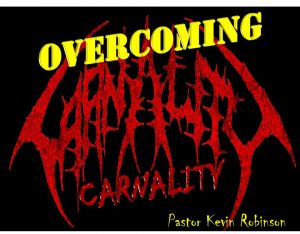 your back with? These are some of the things we must know about an enemy.
your back with? These are some of the things we must know about an enemy. what he wants or feel that he needs. Additionally, to protect himself by misleading, deceiving, and twisting the truth.
what he wants or feel that he needs. Additionally, to protect himself by misleading, deceiving, and twisting the truth. mind is where all of our battles take place. Our spiritual enemy, Satan, attempts to defeat us with strategy and deceit, through well laid plans and deliberate deception. He could never do this without knowing our thoughts.
mind is where all of our battles take place. Our spiritual enemy, Satan, attempts to defeat us with strategy and deceit, through well laid plans and deliberate deception. He could never do this without knowing our thoughts. principles. These are human, carnal, weapons. They cannot stand against the attacks of spiritual forces.
principles. These are human, carnal, weapons. They cannot stand against the attacks of spiritual forces.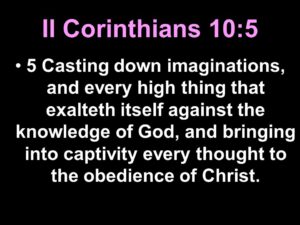

 him? But we have the mind of Christ.”
him? But we have the mind of Christ.”  things that allow us to serve God successfully, all the while eliminating any thoughts that would trip us up. [Heb. 12:1]
things that allow us to serve God successfully, all the while eliminating any thoughts that would trip us up. [Heb. 12:1]